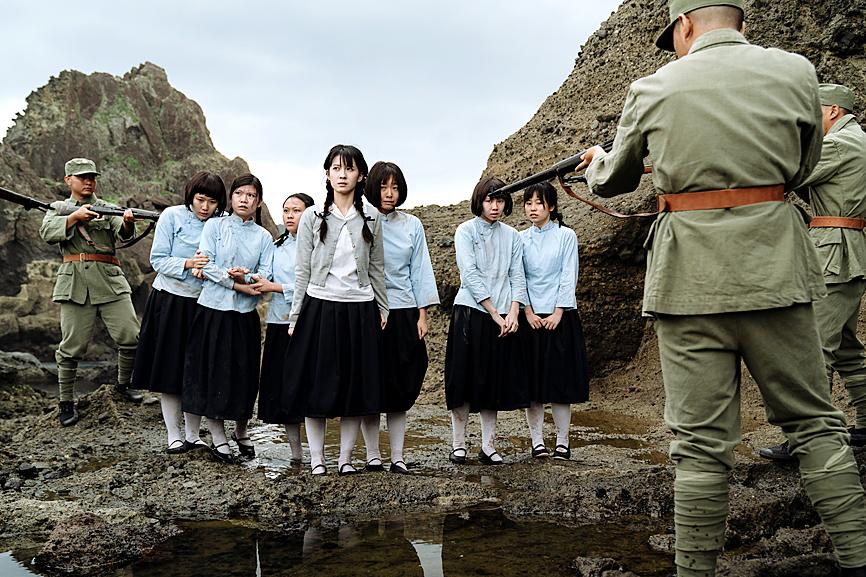A crowdfunding campaign was on Thursday launched to help finish a movie about three women incarcerated on Green Island, the first Taiwanese film to address female political prisoners during the Martial Law era.
Untold Herstory, which has finished principal photography, focuses on three fictional women incarcerated on Green Island in the 1950s. It is adapted from Tsao Chin-jung’s (曹欽榮) Bonfire Island: Untold Herstory, a collection of interviews with women who had been imprisoned on the island.
The filmmakers hope to raise NT$10 million (US$334,024) in the online fundraising campaign to cover post-production costs, promotion, and domestic and international distribution.

Photo courtesy of the Taiwan Film Corp via CNA
The movie stars Yu Pei-jen (余佩真), who portrays a 17-year-old high-school student; Herb Hsu (徐麗雯) as a young mother named Yan Shui-hsia (嚴水霞); and Cindy Lien (連俞涵), who plays a dancer.
Director Zero Chou (周美玲) said that the women Tsao interviewed and their willpower to survive while holding onto their values resonated with her.
She hopes the movie conveys the same grit, courage and tenacity she felt in the words of the women, Chou said.
“Hopefully, this film will become an important testament to the age of transitional justice,” she added.
The film crew spent more than a year scouting the site of the former prison on Green Island off the southeast of Taiwan, as well as talking with political prisoners and their relatives, she said.
However, all that remained of the prison were some wooden pillars, so the crew had to build a set from scratch, she said.
“The greatest challenge that the actors faced was to deliver their lines in the native dialect of the characters they portray, and use the correct terminology of the times to faithfully capture the zeitgeist of the 1950s,” the director said.

An essay competition jointly organized by a local writing society and a publisher affiliated with the Chinese Communist Party (CCP) might have contravened the Act Governing Relations Between the People of the Taiwan Area and the Mainland Area (臺灣地區與大陸地區人民關係條例), the Mainland Affairs Council (MAC) said on Thursday. “In this case, the partner organization is clearly an agency under the CCP’s Fujian Provincial Committee,” MAC Deputy Minister and spokesperson Liang Wen-chieh (梁文傑) said at a news briefing in Taipei. “It also involves bringing Taiwanese students to China with all-expenses-paid arrangements to attend award ceremonies and camps,” Liang said. Those two “characteristics” are typically sufficient

A magnitude 5.9 earthquake that struck about 33km off the coast of Hualien City was the "main shock" in a series of quakes in the area, with aftershocks expected over the next three days, the Central Weather Administration (CWA) said yesterday. Prior to the magnitude 5.9 quake shaking most of Taiwan at 6:53pm yesterday, six other earthquakes stronger than a magnitude of 4, starting with a magnitude 5.5 quake at 6:09pm, occurred in the area. CWA Seismological Center Director Wu Chien-fu (吳健富) confirmed that the quakes were all part of the same series and that the magnitude 5.5 temblor was

The brilliant blue waters, thick foliage and bucolic atmosphere on this seemingly idyllic archipelago deep in the Pacific Ocean belie the key role it now plays in a titanic geopolitical struggle. Palau is again on the front line as China, and the US and its allies prepare their forces in an intensifying contest for control over the Asia-Pacific region. The democratic nation of just 17,000 people hosts US-controlled airstrips and soon-to-be-completed radar installations that the US military describes as “critical” to monitoring vast swathes of water and airspace. It is also a key piece of the second island chain, a string of

The Central Weather Administration has issued a heat alert for southeastern Taiwan, warning of temperatures as high as 36°C today, while alerting some coastal areas of strong winds later in the day. Kaohsiung’s Neimen District (內門) and Pingtung County’s Neipu Township (內埔) are under an orange heat alert, which warns of temperatures as high as 36°C for three consecutive days, the CWA said, citing southwest winds. The heat would also extend to Tainan’s Nansi (楠西) and Yujing (玉井) districts, as well as Pingtung’s Gaoshu (高樹), Yanpu (鹽埔) and Majia (瑪家) townships, it said, forecasting highs of up to 36°C in those areas